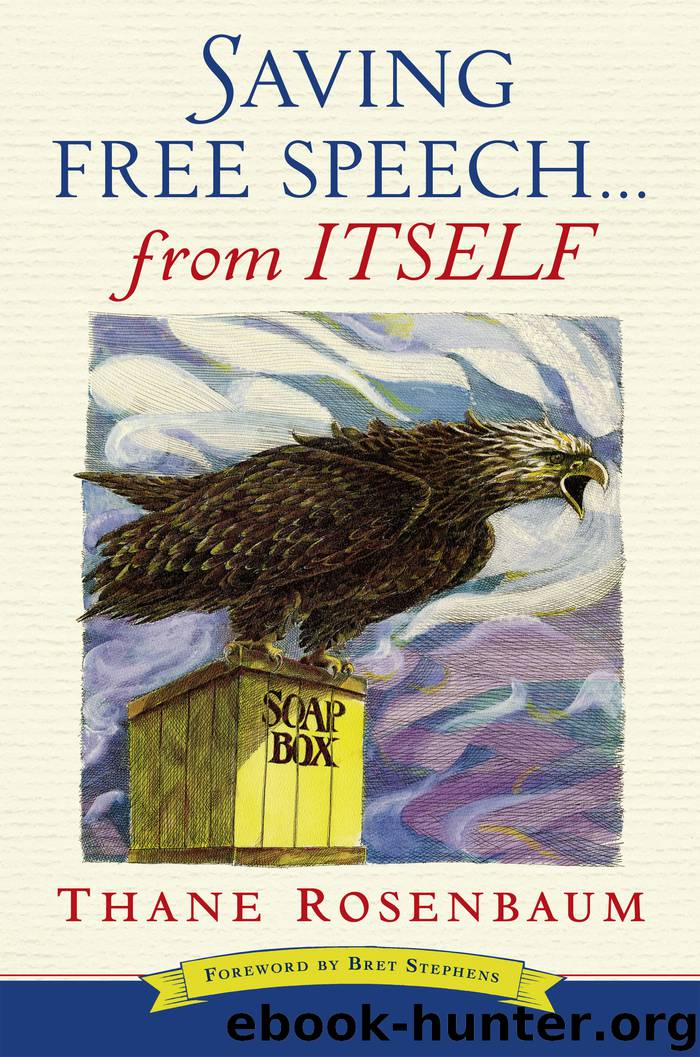Saving Free Speech...from Itself by Thane Rosenbaum

Author:Thane Rosenbaum
Language: eng
Format: epub
Tags: General Fiction
Publisher: Fig Tree Books LLC
Published: 2019-12-10T16:00:00+00:00
22.
SOME WORDS, BY “THEIR VERY UTTERANCE,” LOSE THEIR FREE SPEECH PROTECTIONS
The Founders had fewer hang-ups about speech and possessed more common sense about it as well.
UNDER EXISTING FIRST Amendment case law, some speech is permissibly restricted for categorical reasons. The Fighting Words Doctrine and its seminal case, Chaplinsky v. New Hampshire, is one such category. A civilized society is one that is not prone to casually hurling fighting words at each other. Civilization commands citizens to renounce dueling and honor killings and resolve their disputes through the apparatus of the state. Words that offend human dignity, therefore, expressly violate this legitimate objective of the state. In Chaplinsky, the Supreme Court made special mention of proscribed speech that is defined as the “insulting or ‘fighting words’—those by which their very utterance inflict injury or tend to incite an immediate breach of the peace.”207
Words by “their very utterance,” and nothing more, can “inflict injury.” Nothing else need occur. Merely by speaking them, injury is presumed. Its utterance is per se without First Amendment protection. The language of Chaplinsky is a very powerful statement that the First Amendment cannot operate independent of human dignity. Free speech can never be so free so as to allow certain words to inflict injury or instigate a fight. The Fighting Words Doctrine comes into play when the boundaries of civility have been crossed, injury caused by words is likely, and dignity and social status are under attack. Such hostile circumstances lose protection of the First Amendment.
Placing a limitation on free speech just to curtail physical violence is only half of the human story. Preventing harm to dignity is its own moral imperative.
The Supreme Court understood that some words, by their very utterance, directly cause injury even if they are not likely to instigate a retaliation. The injury they cause is in the form of dignitary harm. And that is injury enough. The Fighting Words Doctrine strips two categories of words that would otherwise receive First Amendment protection: those with the potential to incite a fight; and those that are an affront to human dignity. The Fighting Words Doctrine applies not just in circumstances where speech provokes a fight, or raises the specter of a breach of peace, but also to words that might make a reasonable person fear for his or her safety or violates his or her privacy rights by causing harm to personal dignity.
“Fighting Words” is a catchall phrase for all harm-producing speech. As Heyman pointed out, “It is precisely because fighting words ‘inflict injury’ that they ‘tend to incite an immediate breach of the peace.’ Fighting words injure others through aggression as well as through assaults on their dignity.”208
The Founders had fewer hang-ups about speech and possessed more common sense about it as well. For instance, speech that was prohibited under the Sedition Act of 1798, such as malicious writing against the government “with the intent to defame, or bring either into contempt or disrepute,” was widely accepted by most citizens. Today, such an
Download
This site does not store any files on its server. We only index and link to content provided by other sites. Please contact the content providers to delete copyright contents if any and email us, we'll remove relevant links or contents immediately.
The Secret History by Donna Tartt(19088)
The Social Justice Warrior Handbook by Lisa De Pasquale(12190)
Thirteen Reasons Why by Jay Asher(8909)
This Is How You Lose Her by Junot Diaz(6886)
Weapons of Math Destruction by Cathy O'Neil(6279)
Zero to One by Peter Thiel(5801)
Beartown by Fredrik Backman(5754)
The Myth of the Strong Leader by Archie Brown(5507)
The Fire Next Time by James Baldwin(5444)
How Democracies Die by Steven Levitsky & Daniel Ziblatt(5218)
Promise Me, Dad by Joe Biden(5153)
Stone's Rules by Roger Stone(5087)
A Higher Loyalty: Truth, Lies, and Leadership by James Comey(4962)
100 Deadly Skills by Clint Emerson(4925)
Rise and Kill First by Ronen Bergman(4788)
Secrecy World by Jake Bernstein(4753)
The David Icke Guide to the Global Conspiracy (and how to end it) by David Icke(4717)
The Farm by Tom Rob Smith(4507)
The Doomsday Machine by Daniel Ellsberg(4490)
